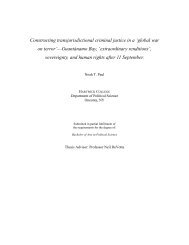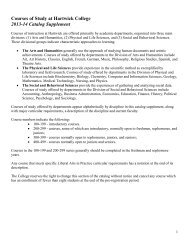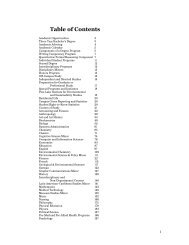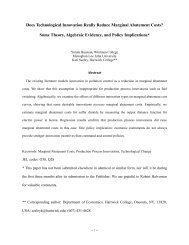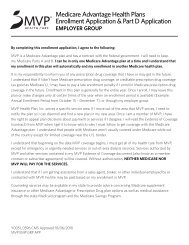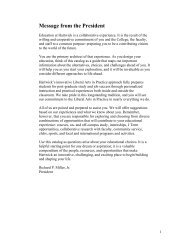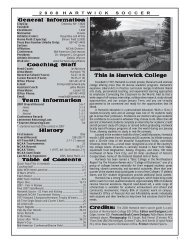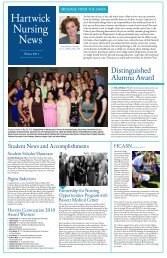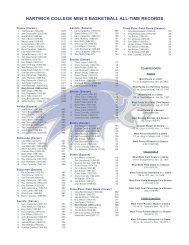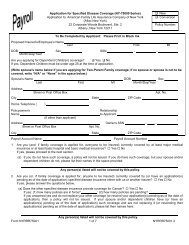Table of Contents - Hartwick College
Table of Contents - Hartwick College
Table of Contents - Hartwick College
You also want an ePaper? Increase the reach of your titles
YUMPU automatically turns print PDFs into web optimized ePapers that Google loves.
problems drawn from various disciplines. Emphasis is placed on the<br />
application <strong>of</strong> topics covered in Math 121 and 233 such as rates <strong>of</strong> change,<br />
maximum-minimum problems, differentials, integrals, non-rectangular<br />
coordinate systems and vectors in two and three dimensions. Problems<br />
addressed are questions which arise in physics, economics, biology and<br />
other areas <strong>of</strong> study. This course is strongly recommended for math<br />
majors and others with interest in applied mathematics. This course does<br />
not count toward satisfying the requirements for a mathematics major or<br />
minor. Prerequisite: Math 233 or 235. Offered J Term. (MLC)<br />
220 Linear Algebra (3 credits) Systems <strong>of</strong> linear equations, matrix<br />
algebra, dependence and independence, vector spaces, transformations.<br />
Applications. Prerequisite: at least a C- in Math 233 or 235. (MLC)<br />
233 Multivariable Calculus (3 credits) This course begins with<br />
techniques <strong>of</strong> integration <strong>of</strong> functions <strong>of</strong> a single variable, then goes on to<br />
include vectors, functions <strong>of</strong> several variables, partial derivatives, multiple<br />
integrals (including alternate coordinate systems), parametric equations,<br />
vector-valued functions, and line integrals. Prerequisite: at least a C- in<br />
Math 121. (MLC)<br />
235 Advanced Single Variable Calculus (3 credits) This course is the<br />
second half <strong>of</strong> the single-variable calculus. It includes techniques <strong>of</strong><br />
integration, applications <strong>of</strong> integration, infinite sequences and series,<br />
polar coordinates, and complex numbers. Prerequisite: at least a C- in<br />
Math 121. (MLC)<br />
308 Mathematical Probability and Statistics (3 credits) Probability<br />
theory, random variables, limit theorems and applications to hypothesis<br />
testing, estimation, regression. Prerequisites: Math 233 and 235. (MLC)<br />
311 Differential Equations (3 credits) Basic theory <strong>of</strong> ordinary<br />
differential equations. Equations <strong>of</strong> first order and first degree, linear<br />
differential equations and linear systems, operational methods, numerical<br />
methods, solution in series, existence and uniqueness theorems.<br />
Prerequisite: Math 233; Prerequisite or corequisite: Math 235. (MLC)<br />
320 Introduction to Abstraction (3 credits) This course prepares<br />
students for the more abstract upper-division courses. Topics such as sets,<br />
logic, mathematical pro<strong>of</strong>, partial orders, equivalence relations,<br />
construction <strong>of</strong> the natural numbers, integers, rational numbers and the<br />
real numbers will be covered. Prerequisite: Math 233, 235, and at least a C<br />
in Math 220. (MLC)<br />
326 Discrete Mathematics (3 credits) Elementary set theory and logic.<br />
Mathematical induction. Principles <strong>of</strong> counting including combinations,<br />
permutations, distributions, derangements, binomial and multinomial<br />
coefficients, pigeon-hole principle, Stirling numbers. Other topics selected<br />
from generating functions, finite state machines and languages, graph<br />
theory, Boolean algebra. Prerequisites: Math 220, 233, and 235. Offered<br />
alternate years. (MLC)<br />
333 Advanced Multivariable Calculus (3 credits) Parameterization<br />
<strong>of</strong> curves and surfaces, curves in 3-space, arc length, surface area,<br />
gradient, divergence, curl, line integrals, surface integrals, theorems <strong>of</strong><br />
Green, Gauss, and Stokes. Prerequisite: Math 233. (MLC)<br />
335 Modern Geometry (3 credits) Structure and flaws <strong>of</strong> Euclidean<br />
geometry as an axiomatic system; development <strong>of</strong> neutral geometry<br />
leading to Euclidean and non-Euclidean geometries. Prerequisites: Math<br />
160



